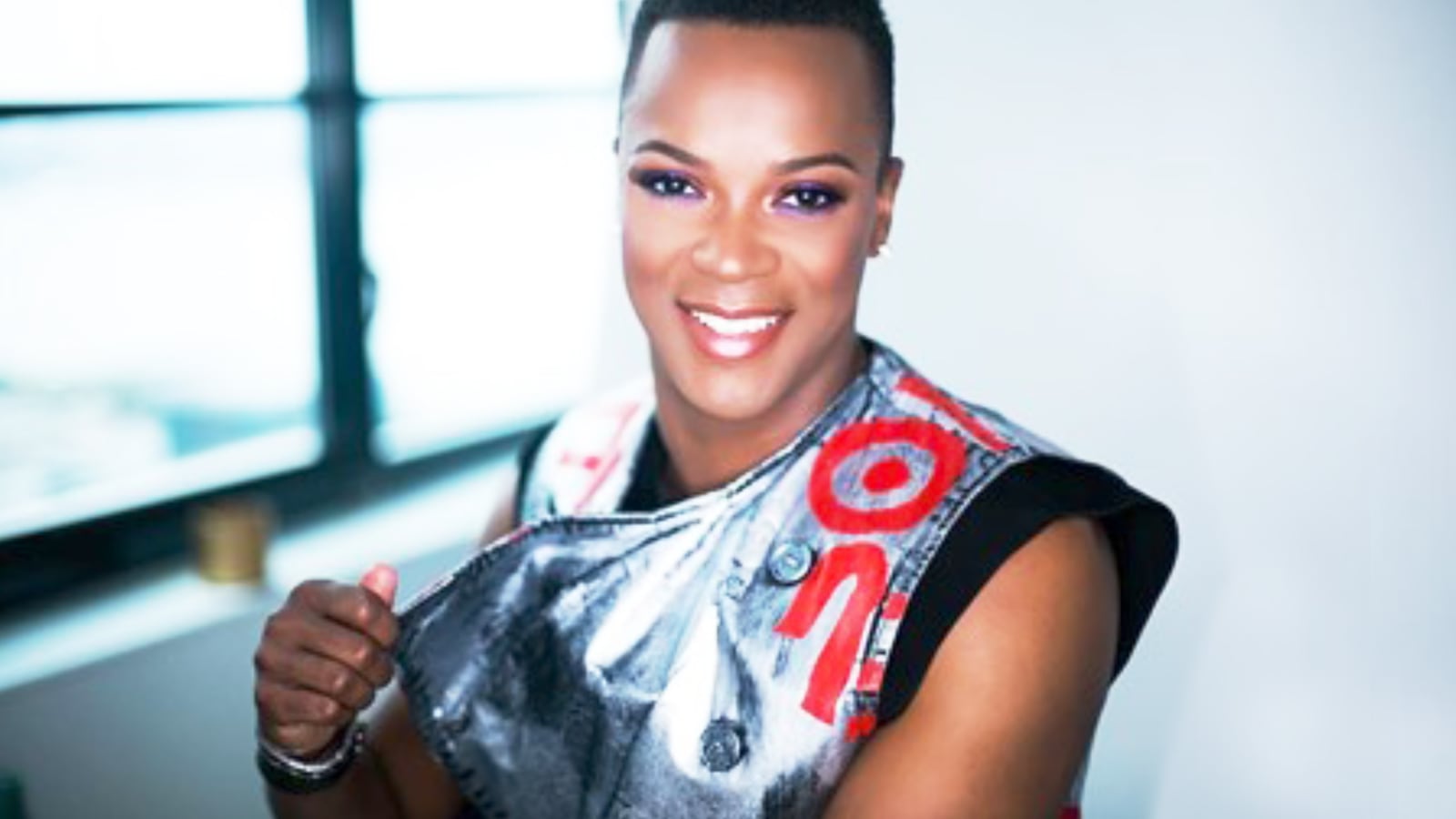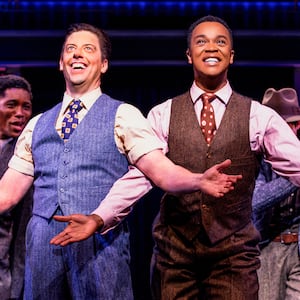In the Broadway production of Some Like It Hot, which opened at the Shubert Theatre in December, Daphne, played by J Harrison Ghee, undergoes a profound transformation. As in the 1959 Billy Wilder film on which the new musical is based, two jazz musicians—Jerry (as Ghee’s character is known at first) and Joe (played by Christian Borle)—go on the run from the mob after witnessing some backstage murders. And wouldn’t you know it? There’s an all-ladies band about to hit the road, and the pair have just the disguises to join them.
But for Daphne, née Jerry, what begins as a ruse—donning womenswear, and with it a more expressly feminine persona—turns into a distinctly modern exploration of nonbinary identity. By the show’s conclusion, Daphne comes to realize that she’s not playing a role but has stepped into a more expansive iteration of who she is.
“We do it to save our lives,” Ghee told The Daily Beast of the show’s primary conceit. “And then I really do save my life by tapping into a fuller version of myself. I'm now free to see and experience the world in a different way, and to walk proudly as a human being.’”
If Ghee slips into first person when describing Daphne’s experience, that’s because it’s remarkably similar to their own. Indeed, in originating the character onstage, Ghee, who identifies as nonbinary (and uses the pronouns he/they, but accepts anything said with respect), has helped shape Daphne into a reflection that feels true to him. (The script is by The Inheritance playwright Matthew López and late-night comedian Amber Ruffin, with a score by Hairspray duo Marc Shaiman and Scott Wittman.)
“I've always confused people, and now I’ve come to love confusing people,” Ghee said in a recent Zoom interview. “I’m a six-four Black human who people are like, ‘What is happening right now?!’ And I’m glad that it makes people question, because there's a little Daphne in everybody,” said Ghee, who can be seen on Instagram in dazzling costumes from the show (designed by Gregg Barnes) and real-life looks that range from sleek, flowy gowns to sports caps and jeans.
“The motto I’ve come to live by is, you have to free yourself to see yourself,” Ghee said. “You have to give yourself the permission that you seek from others to live out loud.”
For Ghee, that permission really began to bloom the first time he performed in drag, during a showcase that marked the culmination of his studies at the American Musical and Dramatic Academy (AMDA) in New York City, where he applied on a whim after seeing a poster in his hometown of Fayetteville, North Carolina.
He had grown up singing in the choir, both in school and at church, where his father was a Baptist minister. He played the Tin Man in a high school production of The Wiz, in which he pretended to tap dance wearing wooden-soled dress shoes. (Now, he taps with aplomb, in Some Like It Hot’s fast-paced footwork from director and choreographer Casey Nicholaw.) But AMDA was where Ghee learned that musical theater combined his talents, and that drag was definitely one of them.
“Drag is such a tool of freedom,” said Ghee, recalling how, when they were little, they used to play in their mother’s clothes in secret, and had just opened up to her about identifying as nonbinary the night before our interview.
“I was explaining to my mom last night how I've always identified as different or as other,” Ghee said. “I remember as a kid shopping for clothes and saying to her, ‘Why do girls get all the fun options?’” But it wasn’t until they performed in drag for the first time, in the AMDA showcase, and then went on to develop their own drag persona, Crystal Demure, that Ghee, like Daphne, fully embraced their feminine possibilities.
“Drag was a doorway for me to be able to step into a fuller version of myself, and I'm truly grateful for it,” Ghee said.

Ghee talks about their journey with identity as one that looks backward in order to move forward. “There's a moment as a child when you know who you are and what you want out of life. And society and your family and other people's opinions get in the way of that, and then you start operating according to others’ feelings or perceptions of you,” Ghee said. “All I’m trying to do is get back to that innocence and purity of who I was as a child.”
Growing up in the church has shaped how they think about their identity and purpose. “My mom always raised me to understand that my gifts were not about me, that they were tools in the service of others,” Ghee said. “Drag is a part of my ministry. It's how I’m effective in the world and how I reach people,” Ghee continued. “It's so empowering to be able to leave a part of myself on that stage and to be a mirror for audiences to have a different perspective. If you can leave thinking just a little differently than when you came, my job is done.”
The current backlash against drag from right-wing conservatives is rooted in fear of the freedoms that it celebrates, Ghee said. “It blows my mind that people are afraid of freedom. What are you so afraid of to be demonizing or weaponizing something that you don't understand?” Ghee said.
Drag has been an integral part of Ghee’s Broadway career thus far. Ghee made their 2017 debut in Kinky Boots as Lola, the drag queen lead (for which Billy Porter won a Tony Award) who rescues an ailing shoe factory. And in last season’s short-lived Mrs. Doubtfire, Ghee played Andre Mayem, the flamboyant makeup artist who helps a deadbeat dad dress up as a beloved nanny.
“I didn't see this coming,” Ghee said. “Getting into theater, I thought, ‘Well, I've got to be a leading man and just fit into these roles. That'll be safe and easy.’ I didn't know that I would get to walk in this freedom and joy, and get to share that with other people,” Ghee said.
Indeed, Ghee’s involvement in Some Like It Hot—their vibrant and sensitive performance as Daphne, as well as the writing that shapes their character’s narrative arc—is what sets the show apart from Mrs. Doubtfire and Tootsie, other recent screen-to-stage adaptations that drew criticism for (among other things) deriving cheap laughs from men wearing dresses and comedy that some considered transphobic.
“We've been very conscious about how we approach it, and making sure that the comedy is not about us being in dresses; everything comedically is about circumstances,” Ghee said of the show’s creative approach, which consciously seeks to avoid pitfalls made by its predecessors in reshaping its source material, an endeavor not everyone has found successful. (While Ghee seems utterly at ease in whatever clothes his character wears, Borle’s Joe-turned-Josephine appears decidedly less so. Still, the most frequent recurring joke targets Josephine’s age rather than other aspects of her appearance.)
“I definitely understand and I'm aware of how people would perceive or think of it as being transgressive,” Ghee said. “I live in intention, purpose, and love. I’m not going to do anything to intentionally harm my own community,” Ghee went on. “Feminine energy is something I am very precious with and protective of; I don't take it lightly,” Ghee said.
“My experience of the response from audiences is that people have felt respected and represented in such a beautiful way that I am so proud of,” Ghee said. “But we can't limit anyone's experience,” acknowledging that everyone shows up with their own valid perspective that merits sensitivity.
“Art should cause conversation,” Ghee said, as indeed men wearing dresses onstage has over the past few Broadway seasons. “There is always a spectrum of human experience, and we have an obligation to show a full version of that while still remaining respectful. You're never going to get it 100 percent correct,” Ghee said. “We have to be uncomfortable to be able to evolve.”
And will the industry evolve to celebrate nonbinary performers like Ghee? So far, the roles have continued to come. “I look forward to opportunities to show the versatility and range that exists within me,” Ghee said.
But gendered categories are not going anywhere in this year’s Tony Awards, Ghee has been told, though he was grateful the producers of Some Like It Hot checked with him before submitting his performance under Lead Actor. And he has no problem with that.
“I'm not going to put myself on this pedestal like, ‘I need it to change today.’ And not for the sake of me not needing it, or lack of understanding people coming behind me, but also knowing it is not going to change overnight,” Ghee said. “I never go into things expecting to be the person that changes everything. I’m just showing up and meeting the moment.”
In the meantime, Ghee’s ministry continues, onstage and off. “I’m not going to show up any less than who I am,” Ghee said. “I will always show up as myself.”







